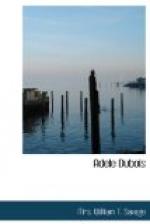Edward Somers was Mrs. Lansdowne’s only brother, her mother having died a week after his birth. She was eleven years of age at the time, and from that early period had watched over and loved him tenderly. He had grown up handsome and accomplished, fascinating in manners and most affectionate toward herself. She had learned that he had been engaged in what appeared, upon the face of it, a dishonorable affair, and her sensitive nature had been greatly shocked.
Two years before, Mr. Lansdowne had taken him as a junior partner in his business. He had since been a member of his sister’s family.
A young foreigner had come to reside in the city, professing himself a member of a noble Italian family. Giuseppe Rossini was poet, orator, and musician. As poet and orator he was pleasing and graceful; as a musician he excelled. He was a brilliant and not obtrusive conversationalist. His enthusiastic expressions of admiration for our free institutions won him favor with all classes. In the fashionable circle he soon became a pet.
Mrs. Lansdowne had from the first distrusted him. There was no tangible foundation for her suspicions, but she had not been able to overcome a certain instinct that warned her from his presence. She watched, with misgivings of heart, her brother’s growing familiarity with the Italian. A facility of temper, his characteristic from boyhood, made her fear that he might not be able to withstand the soft, insinuating voice that veils guilty designs by winning sophistics and appeals to sympathy and friendship. And so it proved.
One day, in extreme agitation, Rossini came to Mr. Somers, requesting the loan of a considerable sum of money, to meet demands made upon him. Remittances daily expected from Europe had failed to reach him. Mr. Somers was unable to command so large a sum as he required. His senior partner was absent from home. But the wily Rossini so won upon his sympathies, that he went to the private safe of his brother-in-law, and took from thence the money necessary to free his friend from embarrassment. He never saw the Italian again.
When the treachery of which he had been the victim burst upon him, together with his own weakness and guilt, he was filled with shame and remorse. Mr. Lansdowne was a man of stern integrity and uncompromising justice. He dared not meet his eye on his return, and he dreaded to communicate the unworthy transaction to his sister, who had so gently yet so faithfully warned him.
He made desperate efforts to get traces of the villain who had deceived him. Unsuccessful—maddened with sorrow and shame, he wrote a brief note of farewell to Mrs. Lansdowne, in which he confessed the wrong he had committed against her husband, which Mr. Lansdowne would reveal to her. He begged her to think as kindly of him as possible, averring that an hour before the deed was done, he could not have believed himself capable of it. Then he forsook the city.




